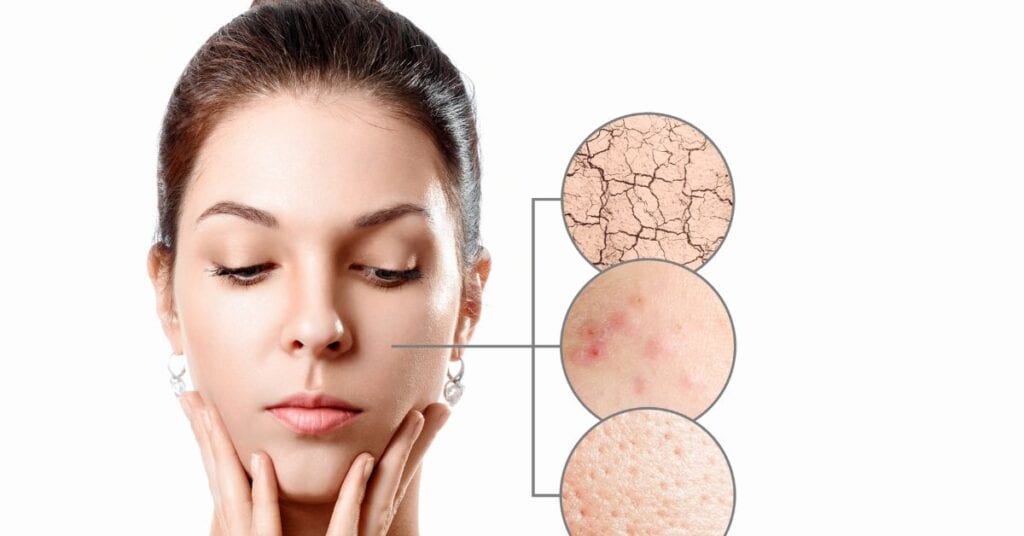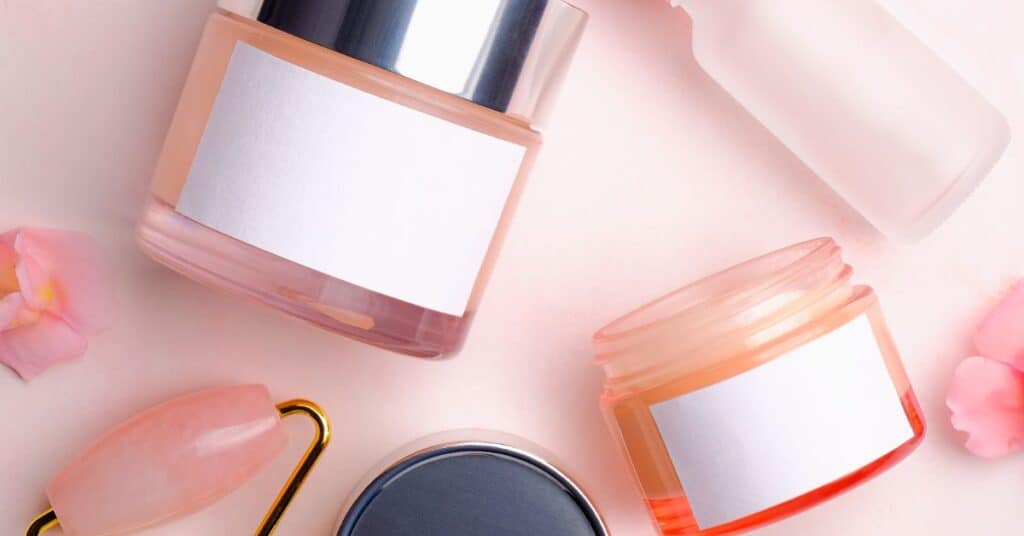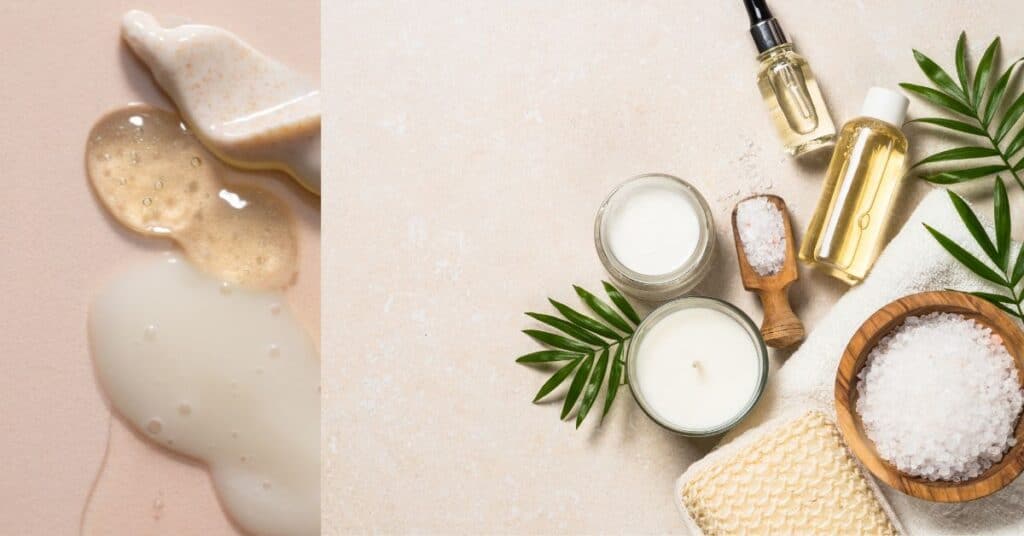Table of Contents
- Skin Darkening VS. Hyperpigmentation
- Why My Skin Is Not Glowing In Winter?
- Can Skin Become Dark In Winter?
- How Can I Remove Darkness From My Face In Winter?
- Does Skin Get Better In The Winter?
- Winter Skincare Routine
- Final Thought
The Winter affects our entire organism; we know how it affects the respiratory system, our bones, and, of course, the skin.
During winter, the skin is exposed to the cold, dry air and temperature changes, which can lead to premature aging if not protected.
Therefore, knowing the additional winter skincare routine for all skin types that must be applied to maintain skin health in winter has many benefits.
In this blog, we will discuss in detail skincare in winter.
Let’s get started!
Skin Darkening VS. Hyperpigmentation
Skin darkening and hyperpigmentation are two related but different terms that describe the appearance of darker patches or spots on the skin. Here is a brief explanation of each term and how they differ:
Skin darkening is when your overall skin tone becomes darker.
This can happen due to various factors, such as the weather, humidity, inflammation, sunlight exposure, and stress. Skin darkening can affect any skin type and any part of the body.
Skin darkening is usually reversible and can be prevented or reduced by following some tips, such as using a humidifier, avoiding hot showers, using a mild cleanser, exfoliating weekly, moisturizing regularly, seeking shade, wearing protective clothing, and seeing a dermatologist if needed.
Hyperpigmentation is the darkening of an area of skin caused by an overproduction of melanin, the pigment that gives color to your hair, skin, and eyes.
Hyperpigmentation can occur due to various causes, such as inflammatory conditions like acne or eczema, injury to the skin, hormonal conditions, medications, and sunlight.
Hyperpigmentation can also affect any skin type and any part of the body, but it usually appears as patches or spots on areas exposed to the sun, like the hands and face.
Hyperpigmentation can be more challenging and may require topical products, chemical peels, lasers, or other procedures.
Therefore, the main difference between skin darkening and hyperpigmentation is that skin darkening affects the whole skin tone, while hyperpigmentation affects only certain areas of the skin.
Skin darkening is more likely to be caused by environmental factors, while internal factors more likely cause hyperpigmentation.
Skin darkening is more accessible to prevent and treat, while hyperpigmentation is more stubborn and may need professional help.
Why My Skin Is Not Glowing In Winter?
There are many possible causes of dull skin in winter, such as low humidity, low sun exposure, contact with harsh chemicals, irritating clothing fibers, excessive use of
Indoor heaters, prolonged hot showers, lack of moisture, smoking, alcohol, junk food, and unhealthy lifestyles.
The lack of sun exposure can reduce essential vitamins like vitamin D that contribute to healthy-looking skin.
Avoid over-exfoliating and use proper moisturization to keep your skin radiant.
How does winter weather affect your skin? No matter what your skin type is or what time of year it is, sebaceous glands produce oil.
Ideally, the glands produce enough oil to lubricate the skin, keeping it flexible and resistant to pathogenic microbes.
However, many face overactive or underactive sebaceous glands, producing oily or dry skin.
Common causes of sebaceous gland overactivity include:
- Genetics.
- Diet.
- Hormonal changes.
When the temperature drops and the cold winds whistle, that dry, cold air and low humidity can spell disaster for our skin!
This combination—cold and dry on the outside and hot and dry on the inside—is too much, even for people with oily skin.
As a result, your oily or combination skin may begin to look and feel dry, sensitive, red, dehydrated, and uncomfortable.
We cannot control the weather nor think about turning off the heating indoors.
What you can easily do to keep your skin comforted and hydrated is to add specific products to improve hydration, thus tricking your skin into thinking that spring is in the air.
How do I know my skin type in winter?
Your skin type may change depending on the season, especially in winter when the air is cold and dry.
Knowing your skin type in winter is pretty much the same as the skin type test in summer.
Even if you know your skin type, you can still go through the skin type test again to see if it has changed due to the change in weather.
Can Skin Become Dark In Winter?
Yes, skin can become dark in winter due to various factors.
The weather. During the winter, our skin becomes dry and tends to shed dead skin cells faster than usual, which leads to dead skin cells accumulating on the surface of our skin, making our skin look darker.
In addition, when it’s cold outside, our blood vessels constrict to minimize heat loss and keep us warm, making our skin look dull and dry.
Although pimples are more common in summer, they can also appear on cold days.
This is because the season brings some habits that can stimulate the production of these tiny dots on the skin.
Hot baths, for example, are mainly responsible for increased oil production, which favors the appearance of blackheads and pimples.
The dry winter air strips natural moisture from the skin, making it look dull and darker.
When our skin becomes inflamed, it produces more melanin – the pigment that gives color to our hair, skin, and eyes. This can result in post-inflammatory hyperpigmentation.
Post-inflammatory hyperpigmentation is a skin condition that causes our skin to darken in color, appearing as tan, brown, dark brown, or even in blue-gray patches and spots.
It is common for some people to associate the drop in temperature with the lack of need to use sunscreen. And that’s precisely where the problem lies.
It turns out that, during autumn and winter, UVA rays also cause damage that compromises the skin’s structure, resulting in spots on the skin.
Therefore, it is crucial to remember that sunscreen must be applied daily, even without sun exposure.
Stress can darken your skin in winter. It triggers hormones that increase blood pressure, heart rate, and blood sugar levels.
This can lead to inflammation and impaired skin barrier function, causing skin darkening. Manage stress by relaxation, sleep, and exercise.
How Can I Remove Darkness From My Face In Winter?
Cleanse your face twice a day with a gentle, soap-free cleanser.
This will help remove dirt, oil, makeup, and impurities from your skin without stripping it of its natural moisture.
Avoid harsh or drying cleansers that irritate your skin and increase oil production.
Moisturizers must contain occlusive components such as dexpanthenol and mineral oil (which reduce the evaporation of water from the skin), humectant components such as propylene
glycol and urea (which draw water into the stratum corneum) and emollient components such as dimethicone and oils (which allow a smooth sensation on the skin).
If you intend to abandon sunscreen during cold, cloudy days, be aware that this is not a good idea. Apply sunscreen every day, even in winter.
Use a serum that targets your specific skin concerns.
A serum is a concentrated product that delivers active ingredients deeper into your skin and addresses particular skin issues.
For oily skin, use a serum that can help control oil, minimize pores, fade acne scars, or brighten your complexion.
Depending on its texture and ingredients, you can apply a serum before or after your moisturizer.
Use a face mask once or twice weekly to deep cleanse, exfoliate, and detoxify your skin. Different fruit masks can prevent dark spots on your skin.
To get rid of dark skin in winter, use aloe vera, papaya, tomatoes and honey extract for your skin.
Choose a face mask that suits your skin needs.
Eat healthy food like fruits, green vegetables, nuts, pulses, legumes, honey, wholegrain, cereals, meat, eggs etc.
Use lukewarm water for bathing. Add a few drops of citrus juice to it. It will clear the skin tone naturally.
Manage your stress levels by practicing relaxation techniques, getting enough sleep, and engaging in physical activity.
Does Skin Get Better In The Winter?
The effect of winter on the skin varies from person to person and depends on several factors, including individual skin type and how one takes care of their skin during the winter months.
Winter weather can have positive and negative effects on the skin, and whether your skin gets better or worse can differ.
Here’s a closer look at the potential impact of winter on the skin:
Positive Effects:
Reduced Sun Exposure: One advantage of winter is that there’s generally less direct sunlight.
Reduced sun exposure can be beneficial as it decreases the risk of sunburn and skin damage caused by harmful UV rays.
Over time, this can contribute to healthier skin.
Cooler Temperatures: Colder air can help reduce redness and inflammation in individuals with skin conditions like rosacea or acne.
The cooler air may also help reduce excess oil production in some people with oily skin.
Hydrating Products: Winter often prompts people to use more affluent, hydrating skincare products to combat dryness.
This can help improve skin hydration and overall skin health.
Negative Effects:
Dryness: Cold air typically contains less moisture, which can lead to skin dryness and dehydration.
Dry skin can become more sensitive and prone to irritation during winter.
Flakiness: Dry winter air can cause the skin to become flaky and develop rough patches, which can be especially noticeable in individuals with dry skin.
Chapped Lips and Hands: The lips and hands are often exposed to the cold, and they can become dry, chapped, and cracked, requiring extra care and protection.
Worsening of Skin Conditions: For some individuals, skin conditions like eczema and psoriasis may worsen in dry, cold weather.
Winter Skincare Routine
The Craving for glowing skin in the winter? Here are things and habits you should consider adapting to.
According to Dr. Shasa Hu, an associate professor in the Department of Dermatology and Cutaneous Surgery at the University of Miami Miller School of Medicine
To help your skin stay healthy during the winter, consider the following tips:
1. Moisturize daily and several times a day on your skin.
This is especially important in those people who suffer from some type of dermatosis (atopic dermatitis, psoriasis.).
A suitable emollient (based on lanolin urea.) will help keep your skin healthy during the winter.
2. Avoid washing your hands excessively.
Wear-and-tear dermatitis that affects the back of the hands is a frequent reason for consultation at this time of year.
Especially in people who, for work reasons, wash themselves repeatedly.
3. Avoid aggressive products when washing hands, face and body. Use gentle, dermatologically tested products.
4. Avoid douching with very hot or freezing water. Use warm water and avoid douching more than once every day, as this would increase skin dehydration.
5. Moisturize your lips and protect them from ultraviolet light. Don’t want to overdo it with exfoliating
The lips suffer a lot in winter, but sometimes there is some fundamental change (atopic, actinic cheilitis.).
6. Remember sunglasses and daily sun protection in winter, especially in areas where there is snow, which reflects 80% of solar radiation.
7. Wear gloves and shelter clothing, particularly for patients with cold sensitivity and who suffer from perniosis (sleeps) or Raynaud’s phenomena (cold hand fingers that turn white, bluish and red in color).
8. Avoid, as much as possible, sudden changes in temperature (from the cold outdoor environment to the warm interior environment of places and houses).
As this increases the possibility of the appearance of dilated capillaries (telangiectasias or vascular spider veins) on the face (especially on the skin), with the resulting aesthetic problem.
9. Maintain a balanced diet with foods rich in antioxidants, omega-3 fatty acids, and vitamins to nourish your skin from the inside.
Stay hydrated by drinking enough water.
For specific skin concerns or conditions, consult a dermatologist who can recommend specialized products or treatments for winter skincare.
Final Thought
With the proper adjustments to your skincare routine, you can ensure your skin remains radiant and healthy throughout the winter.
Additionally, staying hydrated and eating a balanced diet will further boost your skin’s health.
So, embrace the winter season confidently, knowing that your skin will be glowing, even when the temperatures drop.



